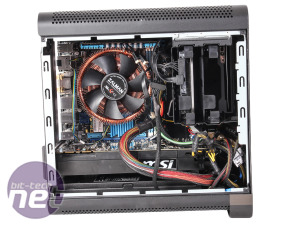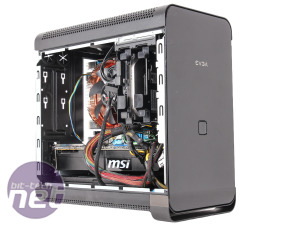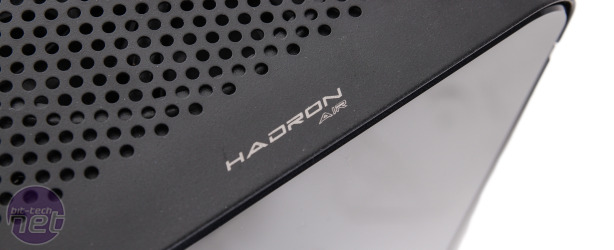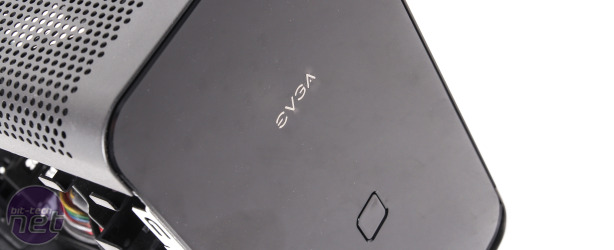EVGA Hadron Air Review - Performance Analysis
Cooling was never going to be amazing in a case so small and sure enough the Hadron Air doesn't set any records. But its GPU delta T of 54°C isn't too bad at all - on par with the Cooler Master Elite 130 and bettering the BitFenix Phenom - although the Prodigy and Fractal Design Node 304 are the real graphics cooling kings. There seem to two main reasons for this. One is the two 120mm fans. These shift a lot of air at 12V, while thankfully remaining fairly inconspicuous, and do a great job of drawing in cooler air through the extensive vents and mesh throughout the rest of the case. The other aspect is probably the proximity of the area of meshing on the base to the opening of the graphics card cooler, with it providing a fresh supply of cool air.Click to enlarge
The CPU delta T was much more mediocre, and the result of 55°C is typical of a small mini-ITX case, being matched by several other dinky cases. Here the case fans seemed to have only a small effect on the cooling, with other cases sporting intake fans, such as the Prodigy and SilverStone SG08, able to shave over 10°C off the CPU delta.
Click to enlarge
A big surprise came courtesy the PSU. As already mentioned, our experience of these slimline server PSUs hasn't been great but despite using one of the smallest fans known to man, it actually kept itself to itself and failed to produce the expected din during our load test. This is great news for the Hadron Air as there's little you could have done to make it quieter if this proved to be an issue.
Click to enlarge
EVGA Hadron Air Review - Conclusion
We can't help but like the Hadron Air despite its hefty price tag. EVGA has done a superb job of crafting a seemingly physics-defyingly small case that can still house a seriously powerful system. The use of a custom PSU is the real trick here, with it allowing EVGA to save a huge amount of space compared to traditional boxy ATX and SFX designs. With it providing plenty enough power for any system you're likely to install, and with it being impressively quiet, there's little reason to want an alternative either. Its presence has upped the price but not too far beyond the cost of any other decent case and PSU combination.EVGA has even managed to provide support for a slot loading optical drive and two 3.5in drives making for an impressive amount of flexibility too.
There are some compromises, with the GPU sitting a little close to the PSU, making installation a bit awkward, CPU cooler height is quite restricted and perhaps biggest of all is that some high-end graphics cards won't quite fit. Nvidia's GTX 780 Ti will fit, just, but AMD's Radeon R9 290X won't and nor will many cards with custom coolers or with dual-GPUs. Water-cooling options are also nearly non-existent, without taking your radiators outside the case. Meanwhile air cooling is only average but, considering the size of this case, you could actually argue it's impressive. Nonetheless, there are enough little issues that we feel an award isn't quite deserved yet - maybe knock £30 for that.
All told, though, if you want the smallest case possible without compromising on performance hardware the EVGA Hadron Air is in a league of its own.
-
Cooling21 / 30
-
Features17 / 20
-
Design27 / 30
-
Value15 / 20


MSI MPG Velox 100R Chassis Review
October 14 2021 | 15:04













Want to comment? Please log in.